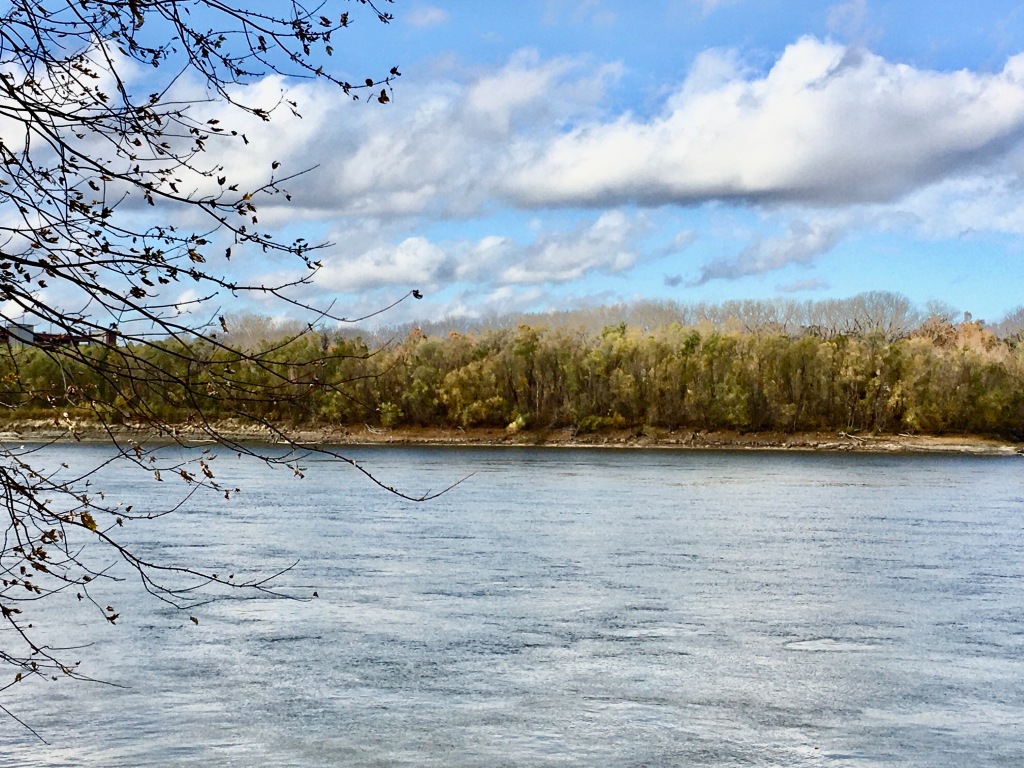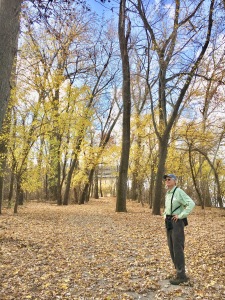Nothing fits!

I tossed and turned. I was losing sleep over … the elections? Corona? Hurricanes and wildfires? No, no and no. I had just finished reading John Banville’s Snow, ostensibly a murder mystery, and my mind was churning over why I felt so unsatisfied.
I started the book on election day because I needed distraction from non-stop TV coverage. A body. In the library. In a country manor house. At Christmas time. I know this formula! Perfect diversion.

At the end, I know who dunnit. I know why. And I know that John Banville, named “Ireland’s greatest living novelist” by the New York Times, the recipient of the Booker Prize, and author of a murder mystery series under the pen name Benjamin Black, is too good a writer to have disturbed my sleep out of literary clumsiness.
This morning, while hiking with Bill along the Missouri River – windblown leaves in the air and sun sparkles off the water – it hit me. Nothing is supposed to fit. Everything is uncomfortable and askew.

The crime, the killing and castration of a priest, takes place in 1950s Ireland. A generation after independence from Britain, the Anglo-Protestant minority continues to be economically and socially better off than the Catholic majority. The Catholic Church holds a repressive sway over every aspect of life.
The protagonist, Detective Saint John (pronounced Sinjun) Strafford, is not easy to like. He’s a plodder – no flashes of genius. He’s socially awkward, and not in the “idiot-savant” way that readers love.
It’s not entirely his fault that he’s such a misfit. He’s an Irish policeman from the Protestant gentry class. He doesn’t like alcohol in a country where liquor lubricates social interactions. He’s clueless about women. He dislikes his co-workers.
Strafford himself is physically uncomfortable throughout the book. His clothes are too flimsy for the weather. He squishes across snowy hillsides in ill-fitting, borrowed Wellington boots, including, at one point, the dead man’s boots. He hulks in other people’s overcoats. Rooms are either freezing or stifling hot. In some cases, they are both, depending on one’s distance from the fireplace. The air in the pub stinks. Strafford’s eyes burn from driving in icy glare.
Social relations are off-kilter as well, and not just for young Strafford. Everyone is uncomfortable because they are all trying to fit into a society that doesn’t work for them. The economic divide. The religious divide. The political divide. Class division. Gender division.
All these societal fissures are so intertwined that the status quo feels inevitable to those within the system. And sitting on this hot mess is the Catholic Church. The Archbishop summons Strafford to suggest that the Irish are too naive and innocent to hear about the murder and mutilation of a priest. As he says, “humankind cannot bear very much reality.”

I certainly cannot bear very much reality. That is how come I’m reading Snow. To get away from the elections. That’s why I’m on a hike. To get away from Covid. Then it hits me that my unease is not unlike the discomfort described in the book. The fissures in American society have so enmeshed us that our societal status quo feels inevitable. White supremacy. Sexism. Environmental degradation.
Before witnessing the murder of George Floyd recorded on cellphone, I was among the many Americans who gave the police the benefit of the doubt. They must have had a reason to shoot, even if the reason was misguided. My heart seized up watching the life flow out of a prostrate George Floyd. Many incidents since then make clear to me that the police mete harsh treatment to Black people just because they are Black. I feel less safe knowing that “equal justice under the law” is a lie.

That is one instance of how the structure of American society is off-kilter. It has taken the accumulated hard work of strivers for justice, new technologies like phone-cameras and drones, and Trump’s Covid response debacle to show me how ill-fitting our twenty-first American society is for all of us. I am not alone thinking this. With me are Black Lives Matter protestors, #MeToo supporters, climate change activists and human rights advocates.
Unlike in the novel, however, I see hope.
Covid has upended our ideas on who the essential workers really are. Not CEOs, movie stars or politicians, but meat-plant workers, nurses’ aides, teachers, trash collectors and, yes, police. Those of us who are monetarily well-off have been boxed into thinking that the stock market will save us in our old age. What we will really need are healthy and well-educated helpers. Who but the essential workers! For our own sakes, we need to promote a society in which they can thrive.
The environment clearly belongs to all of us, but especially to our children and grandchildren. We now have the drone technology to monitor the melting polar caps and ice shelfs. Yet we are still wedded to our McMansions, mass-market clothes and driving!

But there are, and have been, Americans who have been telling us, showing us by example Look! Look! at how our society doesn’t fit us. When I was a teenage in St. Louis in 1963, I didn’t understand the conditions that led to Black (and white) people picketing Jefferson Bank. (Jobs and discriminatory lending practices.) Black leaders did not have the political clout – nor a social media voice – back then. Now, we have Barack and Kamala, James Clyburn and Muriel Bowser and Stacie Abrams — leaders all. See my review of Elijah Cummings’s memoir: We Are Better Than This.
The change in women’s roles also has been ground shifting under our feet. When I was growing up, women became mothers, teachers, nurses and nuns. Now, women make up almost a quarter of Congress!! Women – and people of color – are journalists and pundits on television. It tickles me no end to see the people in Congress (mostly men) get grilled by young women reporters: Yamiche Alcindor, Kasie Hunt, Christine Welker. Savannah Guthrie interviewing Trump was icing on the cake.
Though slowly, some of our values are lining up. In cases of sexual assault, the victim is less often blamed for inciting the attacker. How much further we need to go is exemplified by Donald Trump’s defense against assault allegations: “She’s not my type.” There’s a type that’s okay to assault?
Under the cover of a murder mystery, John Banville’s Snow shows a dysfunctional Ireland with depressive effects on everyone. Nothing fits. In the beginning of the twenty-first century, America is seeing how we all suffer when our society is unjust. Things can change only if we are self-aware to see and are brave enough to act.
Tell me: What have you noticed that is changing in American society?
6 replies on “Social Misfits”
In 2021, I will be in America for 30 years. During these years, I have grown up and learned lots of things about America, its history, culture, people, politics, education… This year has been the most challenging, depressing one. However, lights are at the end of the tunnel, and I am counting down the days to January 20th.
LikeLike
We can’t even hug!
LikeLike
Your analysis reminds me of a poem by another Irishman, W.B.Yates:
The Second Coming
Turning and turning in the widening gyre
The falcon cannot hear the falconer;
Things fall apart; the centre cannot hold;
Mere anarchy is loosed upon the world,
The blood-dimmed tide is loosed, and everywhere
The ceremony of innocence is drowned;
The best lack all conviction, while the worst
Are full of passionate intensity.
I find it difficult to be sanguine about the future. I’ve been through other periods of national trauma – the assassinations of the Kennedys and MLK Jr, Vietnam, Nixon, Iraq – with some degree of hope. Now, it seems we are facing an immense problem, climate catastrophe, with the nation more divided than ever. Those I cherish most, my children and grandchildren, face a difficult road.
LikeLike
Thank you for your observations. I had binged West Wing, but then I broke down and cried over how horrible our ‘dear leader’ was compared to the fictional president on a fictional TV series. Writing about my distress helped. Hopefully we can soon start to move forward with a good person in leadership, even though there is still a big divide.
I wish you a safe and happy Thanksgiving.
Jane
LikeLike
Happy Thanksgiving to you and yours!
LikeLike
Wow, once again, you captured
Our national malaise and some of the reasons behind it. We do live in interesting times..but remember the Chinese saying “be wary of living in those times” . I think that is credited to the Chinese. Stay well..we will get thru this.. happy Thanksgiving
LikeLike